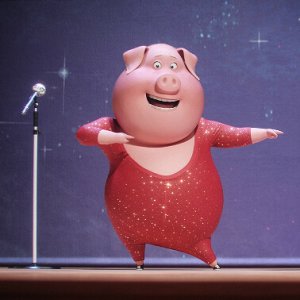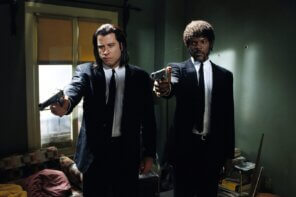Buster Moon desperately wants to save his theater… and himself. When he was a young koala, his parents took him to see a stage production in which a sensational Suffolk sheep named Nana Noodleman (voiced by Jennifer Hudson) sang about “finding a way home…” and “carrying a weight” as she performed a graceful, operatic rendition of the Beatles’ Golden Slumber. That moment convinced him that the theater would not only become his career aspiration, but his very identity and legacy in the world. Sing, directed by Garth Jennings and starring Matthew McConaughey in the lead role as Buster, aptly demonstrates how the law inspires us, but cannot sustain us. In fact, the very law that provokes our ambition for glory mercilessly slays us, leaving us helpless in the wake of its demand that we perform or die.
Moon’s father purchased for him the very building in which he first became enamored with the stage and he would consequently live under the self-induced pressure of needing to earn and justify what his father sacrificed to give him. A succession of failed plays and musicals however, would come to define his reputation as an untalented producer of mediocre and below average entertainment. Consequently, the theater house faces foreclosure and Buster’s only hope of salvaging his childhood dream consists in hosting a contest in which he inadvertently promises worthy contestants a fictitious $10,000 reward.
 An audition draws in a diverse array of eccentric anthropomorphic characters from which Moon makes his final selection consisting of 4 main cast members and 1 behind-the-scenes grip whose stage fright initially conceals her genuine talent. Financial troubles increase, pressure from demanding creditors intensifies, and as a last resort, Buster must seek a loan from the now retired Noodleman whose radiant presence once inspired his desire to break into showbiz in the first place. He invites her to attend and evaluate what he touts as an exceptionally vivid dress rehearsal replete with luminescent squids. Moon ironically finds himself beneath the probationary gaze of the law as he must now work diligently to secure approval from the very sheep whose brilliance once awakened his creativity. The law inevitably destroys the self confidence it initially evokes in us as we are automatically drawn to its glorious vision of the ideal (in Moon’s case, a successful drama career)… and yet the mirage of the promise of fulfilled fantasies becomes a judge scrutinizing our performance, compounding our anxiety, and assuring our certain death.
An audition draws in a diverse array of eccentric anthropomorphic characters from which Moon makes his final selection consisting of 4 main cast members and 1 behind-the-scenes grip whose stage fright initially conceals her genuine talent. Financial troubles increase, pressure from demanding creditors intensifies, and as a last resort, Buster must seek a loan from the now retired Noodleman whose radiant presence once inspired his desire to break into showbiz in the first place. He invites her to attend and evaluate what he touts as an exceptionally vivid dress rehearsal replete with luminescent squids. Moon ironically finds himself beneath the probationary gaze of the law as he must now work diligently to secure approval from the very sheep whose brilliance once awakened his creativity. The law inevitably destroys the self confidence it initially evokes in us as we are automatically drawn to its glorious vision of the ideal (in Moon’s case, a successful drama career)… and yet the mirage of the promise of fulfilled fantasies becomes a judge scrutinizing our performance, compounding our anxiety, and assuring our certain death.
Death as the Fertile Ground of Resurrection
“The best thing about being at the bottom… is you’ve got nowhere to look, but up!” So Buster pontificates after his efforts to impress Nana irreparably fail, after the theater literally collapses, and as the cast and crew finally discover the prize money is non-existent. Moon reaches his lowest point as he resigns himself to being used as a car wash towel in a scene exhibiting a splash of grace as his best friend, Eddie, Nana’s extremely narcissistic nephew willingly joins him in the degradation. From this place of death and ignominy, Moon accidentally overhears the faintly perceptible voice of Meenah, the shy teenage elephant whose coyness disqualified her during the initial audition. The introverted pachyderm sits among the rubble of the ruined theater singing Leonard Cohen’s Hallelujah — a song richly implying that true devotion exists in the sacrosanct and the vulgar alike; that worship flows from the lips of the broken as sincerely and legitimately as it pours from those of the pious; that which is holy inculcates the profane… in a sense because the Divine became flesh and lived among us.
In and from a place of death and abasement, Buster Moon literally hears gospel and his theater resurrects. Yes, the show must go on… but this time without the hope of a monetary incentive motivating the cast. Losing everything freed them from needing to work in order to earn a reward… in short, losing and dying freed from them the law. More importantly, death liberated them from the fear of failure. And in the absence of such fear, their artistic ingenuity was set free to truly sing. Three vignettes in particular underscore this:
 Ash (Scarlett Johansson), a punk rock porcupine whose boyfriend, Lance relegated her to back up vocals and sought to squelch her creative contributions to their stereotypical anti-establishment band finally finds her own song. Jilted by Lance who replaces her with another love interest, she sings with conviction and sincerity from the place of affliction and despair. Her narrative reminds us that our songs flow from and yet transcend our hurts… and our hurts both punctuate and narrate our stories.
Ash (Scarlett Johansson), a punk rock porcupine whose boyfriend, Lance relegated her to back up vocals and sought to squelch her creative contributions to their stereotypical anti-establishment band finally finds her own song. Jilted by Lance who replaces her with another love interest, she sings with conviction and sincerity from the place of affliction and despair. Her narrative reminds us that our songs flow from and yet transcend our hurts… and our hurts both punctuate and narrate our stories.
Rosita (Reese Witherspoon), a mother of countless piglets and wife of a husband who fails to appreciate her worth as caretaker of the home discovers and displays through her final musical number that her mundane, ordinary life is already sanctified in its banality… she need not ascend to stardom to count or to matter. Her spectacular conveyance of “Shake It Off” in which she and her dance partner Gunter incorporate depictions of her routine day-to-day mommy responsibilities demonstrates the inherent pizzazz in an apparently boring life.
Johnny’s (Taron Egerton) cover of “I’m Still Standing” penetrates the prison bars of a cell in which his father sits due to the young gorilla’s inability to please his father by serving as a faithful and effective getaway driver in a heist. The intensity with which Johnny sings applies law and gospel to his dad’s heart — he’s convicted of failing to affirm his son… he is consequently empowered to literally break free from prison for a long overdue father-son reunion.
Sing Your Life!
Does the absence of fear free us to proverbially “sing”? It can… at times… but it doesn’t always (by the way, the film’s title is in the imperative…). Even as a people liberated from fear and living perfectly in the love of God and in the knowledge of His acceptance, our horizontal lives don’t always match in expression the reality of the freedom we have in the Spirit. And that’s okay. We have been sanctified by the One who perpetually lived in the light of His father’s acceptance and freely sang FOR us (Hebrews 2:12).
The first Adam feared and cast the same shadow of anxiety over all of us. The Last Adam trusted all the way to His final trembling moments of choosing God’s will over His own. Incidentally, Matthew’s gospel records Jesus leading the disciples in song prior to completing his obedience as He thankfully received the cup His Father gave Him. His entire life is a harmonious song blending deity and humanity, faith and work, justice and mercy, temptation and submission to the will of God. Ultimately though, Jesus is the song God sang when He revealed Himself as a perfect symphony of grace and truth. And yes, there is way to get back home… because Jesus carried our weight. You know, the unbearable weight of having to make your life sing… if you’re in Christ, it already does!





